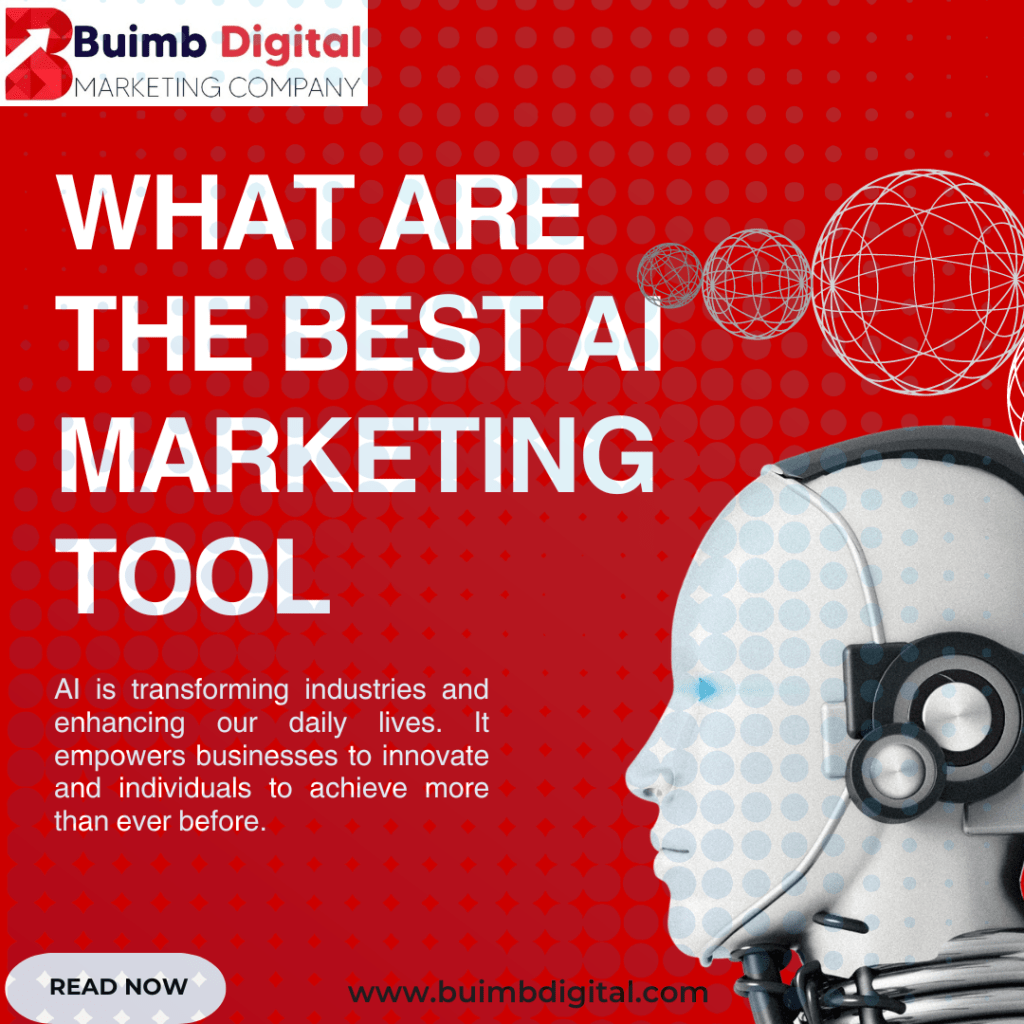What are the best Marketing AI Tool?
Understanding AI in Marketing
Before diving into specific tools, it’s crucial to grasp the role of AI in marketing. AI encompasses a range of technologies that enable machines to simulate human intelligence, learning from data, identifying patterns, and making decisions. In marketing, AI is leveraged across various functions:
- Data Analysis and Insights: AI can analyze vast amounts of customer data to uncover actionable insights and trends.
- Personalization: By understanding individual preferences and behaviors, AI enables highly personalized marketing campaigns.
- Automation: AI automates repetitive tasks, streamlining workflows and freeing up marketers to focus on strategic initiatives.
- Predictive Analytics: AI algorithms forecast future outcomes based on historical data, helping marketers make data-driven decisions.

Top AI Tools for Marketing in 2024
1. HubSpot
HubSpot is a leading CRM platform that integrates AI-powered tools for marketing, sales, and customer service. Key AI features include:
- Lead Scoring: AI analyzes leads based on behavior and engagement, prioritizing those most likely to convert.
- Content Optimization: AI suggests improvements to content based on SEO best practices and performance metrics.
- Email Marketing: AI-driven email marketing tools personalize content and timing for higher engagement.
2. Google AI
Google AI offers a suite of tools that empower marketers with advanced analytics and automation capabilities:
- Google Analytics 4: AI-powered insights provide a deeper understanding of customer journeys and behavior.
- Google Ads: AI optimizes ad campaigns for performance, targeting, and bidding strategies.
- Google Optimize: AI-driven A/B testing enhances website performance and user experience.
3. Adobe Sensei
Adobe Sensei is Adobe’s AI and machine learning framework embedded across its Creative Cloud and Experience Cloud products:
- Personalization: Sensei delivers personalized content recommendations and experiences based on user behavior.
- Content Creation: AI automates mundane tasks in creative workflows, such as image editing and layout design.
- Predictive Analytics: Sensei predicts campaign performance and recommends optimizations in real-time.
4. IBM Watson
IBM Watson is renowned for its cognitive computing capabilities, offering AI solutions tailored for marketing:
- Customer Insights: Watson analyzes unstructured data from various sources to uncover actionable insights.
- Chatbots: AI-powered chatbots provide personalized customer support and streamline lead generation.
- Campaign Optimization: Watson optimizes marketing campaigns by predicting customer responses and adjusting strategies accordingly.
5. Salesforce Einstein
Salesforce Einstein is an AI-powered CRM platform that enhances marketing automation and predictive analytics:
- Predictive Scoring: Einstein scores leads based on behavior, demographics, and engagement history.
- AI-Powered Analytics: Einstein uncovers patterns in data to inform marketing strategies and campaign optimizations.
- Recommendation Engine: AI-driven recommendations personalize interactions across channels for increased engagement.
Case Studies: Real-World Applications
To illustrate the impact of AI tools in marketing, let’s explore two compelling case studies:
Case Study 1: Personalization at Scale with Netflix
Netflix leverages AI to deliver hyper-personalized recommendations to its users. By analyzing viewing history, preferences, and contextual data, Netflix’s recommendation engine suggests content tailored to individual tastes, thereby enhancing user satisfaction and retention.
Case Study 2: Predictive Analytics at Amazon
Amazon utilizes AI-powered predictive analytics to forecast customer demand and optimize inventory management. By analyzing historical sales data, seasonal trends, and external factors, Amazon anticipates product demand with remarkable accuracy, ensuring adequate stock levels and minimizing inventory costs.
The Future of AI in Marketing
Looking ahead, AI’s role in marketing is poised to expand further with advancements in machine learning, natural language processing, and computer vision. Future trends include:
- Voice Search Optimization: AI will play a crucial role in optimizing content for voice search queries, which are increasingly prevalent with the rise of smart speakers.
- Augmented Reality (AR) and Virtual Reality (VR): AI-powered AR and VR experiences will revolutionize product demonstrations and customer engagement.
- Ethical Considerations: As AI becomes more pervasive, marketers must navigate ethical concerns surrounding data privacy, algorithm biases, and transparency in AI-driven decision-making.
Conclusion
In conclusion, AI tools have revolutionized the marketing landscape, empowering businesses to deliver personalized experiences, optimize campaigns, and drive revenue growth. By harnessing the power of AI-driven insights and automation, marketers can stay agile in a rapidly evolving digital ecosystem. As we look to 2023 and beyond, embracing AI will be essential for staying competitive and meeting the ever-changing demands of consumers.Whether you’re a seasoned marketer or just beginning to explore AI’s potential, integrating these advanced tools into your strategy can unlock new opportunities and propel your brand to greater heights. Embrace AI, and harness its transformative power to shape the future of marketing.



